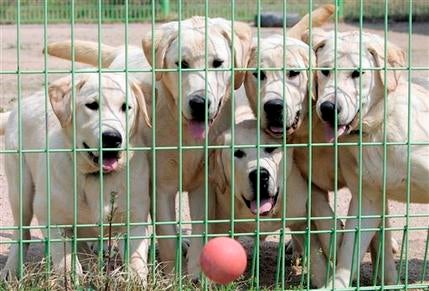Drug-Sniffing Clones
South Korean officials are training seven cloned canines to work as drug detectors

In 2005, South Korean scientists created the world’s first cloned dog, and now the country has announced plans to use clones to sniff for drugs. Yesterday the Korean Customs Service announced that seven Labrador retrievers had been cloned from an expert drug-sniffer that is still on the job. The scientists leading the research at one point worked with disgraced researcher Hwang Woo-suk, but the dog cloning work is legitimate.
The clones are being trained near Incheon International Airport, and all are reported to be healthy. And, strangely, they’ve all been given the same name: Toppy. Each one cost between $100,000 and $150,000 to clone, but that investment could pay off in the long run, if they become successful drug detectors. The dogs are now part of the way through a series of tests set up to establish whether or not they’re really fit for the job. Good genes aren’t always enough, after all.
Via AP